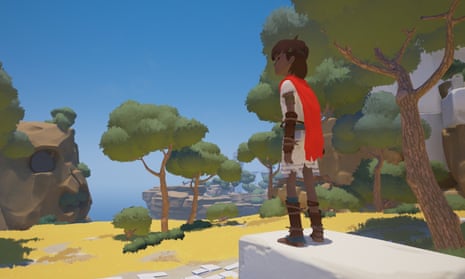The story begins, as so many do, with a stormy sea, a flash of lightning, and a shipwreck. A child washes up on a deserted island and, with nary a word of exposition, embarks upon an epic journey.
Tequila Works’ third-person puzzle adventure has been touted as an homage to Fumito Ueda’s Ico and The Last Guardian. But while they share some striking similarities, telling the story of a young kid tentatively finding their place in a big, confusing world, Rime takes the material down a melancholic path that’s very much its own.
First announced in 2013, it has endured an appropriately tempestuous development, often sailing as close to the rocks as its ill-fated protagonist. Initially conceived as an action RPG, it was wedded first to Microsoft, then to Sony, before Spanish indie developer Tequila Works (also behind this year’s well-received The Sexy Brutale) reacquired the IP, making it available on multiple platforms.
The final product, however, bears few of the visual scars often associated with a long, difficult gestation – its cartoonish, cel-shaded graphics are as timeless as its age-old story.
The kid (the protagonist is designed to be non-gender specific) finds a delightful Prospero’s island filled with wildlife, crumbling ruins and vertiginous towers, the surreal architecture drawing inspiration from the works of Italian painter Giorgio de Chirico (another thing it shares with Ueda’s games).
It brilliantly encapsulates the sensation of being lost in a dream, where everything is at once familiar and alien. And like a dream, it can at times bleed into something more frightening, when things that had appeared benign become threatening, and places that were beautiful seem suddenly ominous.

The warren of caverns, temples and mountain tops give a sense of limitless possibility; at any moment you might be able to clamber up vines, shuffle across a ledge, or leap into the azure ocean. Yet through clever manipulation of light and subtle visual pointers (plus the help of a yapping fox, and a figure in red who haunts the island, only ever glimpsed from afar), you’re led inexorably down a more or less linear path. Often you’ll be unwittingly led back through passageways you’ve previously explored, making the world seem bigger than it really is, a trick creative director Raúl Rubio says he picked up by studying the level design in Demon Souls and Dark Souls.
Unlike those games, in Rime, death is of no consequence – fall too far and the screen will cut to black, only to place you back where you started. Get caught by the game’s only real antagonist, a dinosaur-like bird that swoops down from above, and you’ll lose only seconds of progress, rather than minutes or hours.
Rime has no desire to pummel you until you learn its systems – it’s content to let you walk gently down its scripted path, soaking up the ambience, swimming with the jellyfish, admiring the view.
Each of its five explorable areas uses a distinct colour palette, reflecting the young protagonist’s growing sense of awakening and unease. What begins as a picture-postcard beach splashed in vivid primary colours gives way to a desert painted in shades of baked ochre, then a bedraggled and overgrown castle whose gleaming white has been reclaimed by verdant green. Eventually the colours become so dark you may need to adjust the brightness on your TV.

The fug of metaphor lies thick over this island – each chapter ends with your character running towards the blinding light of a giant keyhole, for instance – and Rime uses its small protagonist to explore some big issues: life, death, grief, responsibility.
Gameplay is stripped back to the bare essentials: there’s no HUD, no skill tree, no attack button. All you can do is run, pick things up and, crucially, shout. I say crucially because at its heart, Rime is about capturing the sensation of being a child, the feeling of walking into a cave and yelling just for the simple joy of hearing your voice reflected back at you.
Its puzzles are elegant but untaxing, usually limited to “go over there and shout at that statue”, existing mostly to focus your mind as you progress through the game. Even the more complex set-ups, such as an early puzzle that allows you to control the day/night cycle, don’t build beyond their initial use, rarely requiring you to think laterally or juggle different concepts. This gives the experience a meditative quality, amplified by David García Díaz’s brilliant orchestral score, which never misses an emotional beat.
The light platforming elements do escalate towards the end of the game, when your path over increasingly rain-soaked terrain becomes less clearly signposted. This doesn’t make progress harder, just more time consuming and occasionally more frustrating. The whole adventure lasts around seven hours, and while there are some well-hidden collectibles, replay value is low.
Rime exists in a well-trodden video-game niche, remarkable for neither its concept nor its execution. But it transcends its limitations by tapping into something universal: a child’s feelings of wonder at a strange and sometimes dangerous world.
The final credits include a series of heartfelt messages from the developers, one of which stood out: “To grandparents and their forgotten stories”. Like the game itself, it’s a simple statement that’s both endearing and heartbreaking. It hints at the thousand real-life moments of grief and joy that served as inspiration for this game. That emotional weight shines through, making Rime a thoroughly rewarding experience.
Tequila Works/Grey Box; PC/PS4/Xbox One(version tested)/Nintendo Switch (date TBC); £29.99; Pegi: 7
